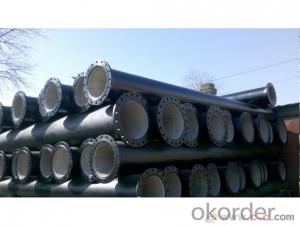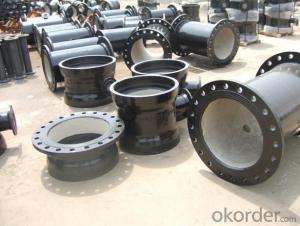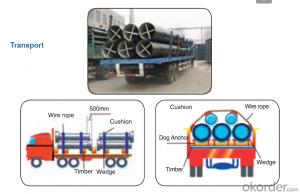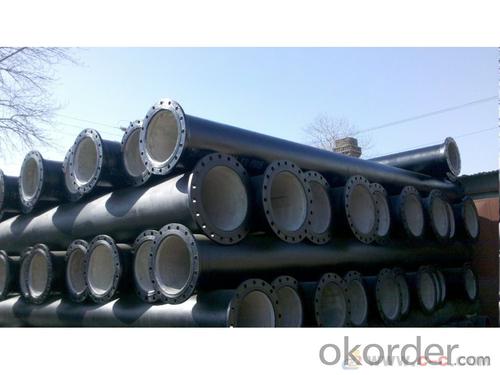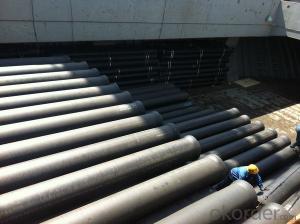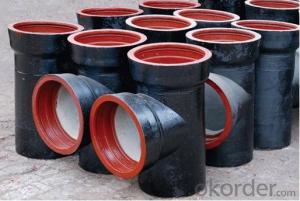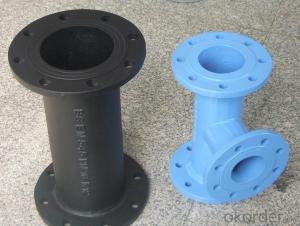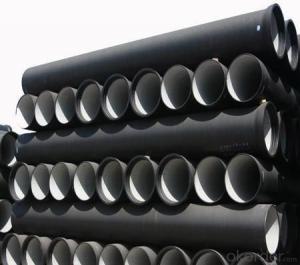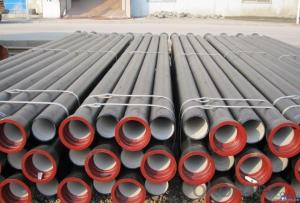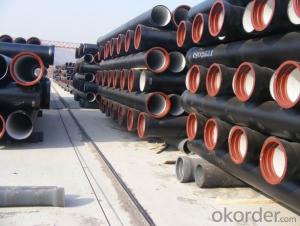Duct Iron Pipe DI Pipe Flange Pipe with Screwed ISO 2531
- Loading Port:
- Tianjin
- Payment Terms:
- TT OR LC
- Min Order Qty:
- 100 m
- Supply Capability:
- 100000 m/month
OKorder Service Pledge
OKorder Financial Service
You Might Also Like
Ductile iron pipe fittings:
Dimensions standard:
ISO2531: 50-1000mm, PN10/16
BS4772: 50-1000mm, PN10/16
EN545: 50-1000mm, PN10/16
Connecting mode:
Flanged
Socketed
Mechanical connection
Loose flanged
Coatings:
Inner lined with cement and outside coated with zinc plus bitumen
Inner and outside coated with epoxy resin
Inner and outside coated with fusion bonded epoxy resin


Quality:
ISO 2531 or EN 545 Standard K9 Class, K12 Class
1. ISO 9001 Certificate
2. ISO 2531 & EN 545 Certificate
3. WRAS Potable Water Certificate for FBE Internal Lining
4. WRAS EPDM Rubber Gasket or NBR Rubber Gasket
5. DN80mm - DN2000mm
6. Black Bitumen or Blue FBE / Epoxy Coating
7. Lengh = 6m or cut into 5.6m, 5.7m, 5.8m
8. Client's Brand Customization Allowable
9. Container or Bulk Loading / Shipping
10.Delivery within one Month or According to Client's Order Quantity
11. Support Client or The Third Party Inspection before Shipment
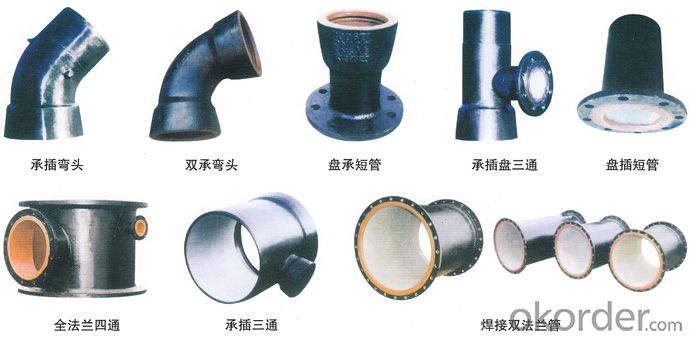
Transport:
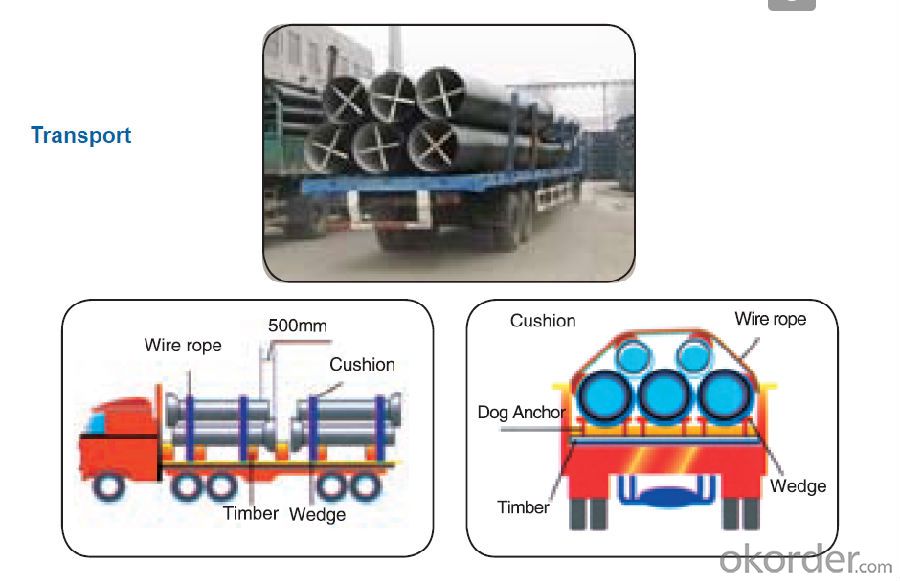
- Q: Can ductile iron pipes be used in geothermal systems?
- Yes, ductile iron pipes can be used in geothermal systems. Ductile iron pipes are known for their high strength and durability, making them a suitable choice for various applications, including geothermal systems. Geothermal systems involve the extraction of heat from the earth's subsurface, which requires a reliable and robust piping system to transport the geothermal fluid. Ductile iron pipes are capable of withstanding high temperatures and pressures, making them ideal for carrying hot geothermal fluids. Additionally, ductile iron pipes have excellent corrosion resistance, which is important for geothermal systems as they often involve the circulation of corrosive fluids. Overall, ductile iron pipes are a viable option for geothermal systems due to their strength, durability, and resistance to high temperatures and corrosion.
- Q: What are the lubricants for the installation of ductile iron pipes for tap water?
- Lubricant used to reduce frictional resistance of friction pairs and to retard wear of lubricating medium.
- Q: Can ductile iron pipes be used for underground oil and gas pipelines?
- Underground oil and gas pipelines can utilize ductile iron pipes, which offer a robust and enduring material capable of withstanding the demanding characteristics of oil and gas transportation. With its exceptional tensile strength and impact resistance, ductile iron brings a high level of suitability for subterranean applications. Additionally, these pipes exhibit resistance against external loads, a crucial attribute for underground pipelines that might experience soil movements or heavy traffic. Moreover, the easy assembly of ductile iron pipes facilitates efficient installation and maintenance procedures. Nevertheless, it is crucial to carefully consider a range of factors, including soil conditions, environmental elements, and specific project prerequisites, prior to selecting ductile iron pipes for underground oil and gas pipelines.
- Q: Can ductile iron pipes be used for agricultural applications?
- Certainly, agricultural applications can make use of ductile iron pipes. Ductile iron, being a robust and long-lasting material, possesses a corrosion-resistant property that renders it appropriate for diverse agricultural purposes. These pipes are applicable for irrigation systems, drainage systems, water supply systems, and other agricultural infrastructure projects. With their exceptional tensile strength, ductile iron pipes can endure the external pressures and stress that agricultural environments may impose. Furthermore, their prolonged lifespan lessens the necessity for frequent replacements, and they are capable of accommodating high water flow rates. Consequently, ductile iron pipes emerge as a dependable choice for agricultural applications.
- Q: How can 4 inch ductile iron pipe be connected with 2 inch galvanized pipe?
- Ductile cast iron used for more than 18 by adding nodulizer, after centrifugal ductile cast iron machine high speed centrifugal cast pipe, called "ductile" (Ductile Cast Iron Pipes), referred to as ball pipe, ductile iron pipe and ductile iron pipe etc.. The utility model is mainly used for conveying water, and is an ideal choice for tap water pipes.
- Q: How do ductile iron pipes handle ground settlement near construction foundations?
- Ductile iron pipes are renowned for their effectiveness in handling ground settlement near construction foundations. Their flexible nature enables them to withstand ground movement without suffering severe damage or failure. When the ground settles near construction foundations, it exerts pressure on the surrounding infrastructure, potentially causing shifts in the soil. Ductile iron pipes have the advantage of absorbing and distributing this pressure, minimizing the risk of pipe breakage or deformation. A significant factor contributing to the resilience of ductile iron pipes is their high tensile strength. This strength enables the pipes to maintain their structural integrity even under substantial external forces. Consequently, they can endure ground settlement without experiencing fractures or cracks. Moreover, ductile iron pipes possess a high level of flexibility. This flexibility allows them to adapt to minor ground movements and accommodate shifts in the soil without compromising their functionality. The pipes can bend slightly without breaking or causing leaks, ensuring a continuous flow of fluids and preventing disruptions to the construction project. Additionally, ductile iron pipes are commonly installed with appropriate bedding and backfill materials. This ensures that the pipes have a stable and secure foundation, minimizing the risk of movement and settlement. The use of these materials also helps distribute the load exerted on the pipes more evenly, further enhancing their ability to handle ground settlement. All in all, ductile iron pipes are an excellent choice for construction projects that involve concerns about ground settlement. Their strength, flexibility, and proper installation techniques allow them to effectively handle ground movement near construction foundations, resulting in reliable and long-lasting infrastructure.
- Q: How does ductile iron pipe perform in areas with high soil corrosivity?
- Due to its inherent corrosion-resistant properties, ductile iron pipe exhibits exceptional performance in areas with high soil corrosivity. The material specifically utilized in ductile iron pipes is engineered to endure harsh soil conditions, including those with elevated levels of corrosive elements. The protective coating is one of the key factors making ductile iron pipe suitable for areas with high soil corrosivity. Most ductile iron pipes are coated with either a layer of cement mortar or a polyethylene sleeve, which acts as a barrier separating the soil from the pipe. This coating serves the dual purpose of preventing direct contact between the soil and the iron, as well as providing an additional layer of defense against corrosion. Moreover, ductile iron possesses inherent corrosion resistance. It contains a higher carbon percentage compared to traditional cast iron, enhancing its strength and durability. The carbon content also generates a protective layer of graphite within the iron matrix, acting as a natural barrier against corrosion. Ductile iron pipes have demonstrated a long service life in areas with high soil corrosivity, often surpassing 100 years. This is due to their ability to withstand corrosion and maintain structural integrity even in harsh environments. Additionally, ductile iron pipes exhibit high resistance to external loads and can endure the stresses associated with high soil corrosivity. In summary, ductile iron pipe is an exceptional choice for areas with high soil corrosivity. Its corrosion-resistant properties, coupled with protective coatings, guarantee the pipe's durability and reliability, even under the most challenging soil conditions.
- Q: What are the risks in the process of conveying ductile iron pipes?
- Transportation: when transporting pipes by car, two or more pieces of wood should be placed on the platform. The tubes are placed on the wood and fixed with wedges. The pipe out of the car parts shall not exceed the length of 1/4 in vitro. When more than one layer of pipe is installed, the direction of the pipe shall be reversed in each layer, and cushion or cushion shall be added between the two layers of pipes. Finally, the wire rope and cushion are fixed firmly. In the process of transportation, check the risk of falling pipe frequently, check whether the stop wedge is loose, slow down when the road is rough or sharp turn.
- Q: Are ductile iron pipes suitable for use in agricultural applications?
- Indeed, agricultural applications can benefit from the utilization of ductile iron pipes. Renowned for their remarkable strength and durability, these pipes are well-suited to endure the substantial loads and pressures frequently encountered in agricultural operations. Furthermore, their exceptional resistance to corrosion proves invaluable in agricultural settings where pipes may come into contact with chemicals or fertilizers. Additionally, the long lifespan of ductile iron pipes diminishes the necessity for frequent replacements, thereby minimizing maintenance expenses. In summary, the dependable choice of ductile iron pipes stems from their resilient nature and capacity to meet diverse agricultural demands.
- Q: What is the external coating used in ductile iron pipes?
- Ductile iron pipes usually have an external coating made of protective materials like zinc or asphalt. These coatings are applied to the pipe's surface to prevent corrosion and shield the iron from its surroundings. Zinc coatings, like hot-dip galvanizing, are widely employed because of their exceptional resistance to corrosion. Conversely, asphalt coatings offer a resilient and adaptable shield against corrosion and abrasion. The selection of the coating relies on factors such as the intended use, environmental circumstances, and project-specific requirements.
Send your message to us
Duct Iron Pipe DI Pipe Flange Pipe with Screwed ISO 2531
- Loading Port:
- Tianjin
- Payment Terms:
- TT OR LC
- Min Order Qty:
- 100 m
- Supply Capability:
- 100000 m/month
OKorder Service Pledge
OKorder Financial Service
Similar products
Hot products
Hot Searches
Related keywords
